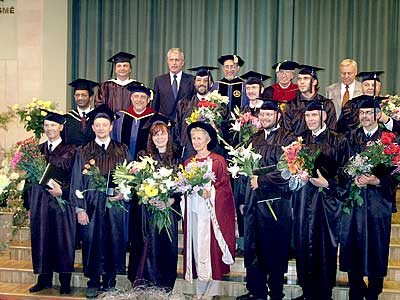First Graduation of Ministerial Students in Baltics

at the graduation ceremony in Riga, Latvia. July 27, 2002.
Dr Gudmundur Olafsson, director of the Riga programme at Newbold College, Binfield, Berkshire, England, sketched the historical development of the pastor education programme in the Baltic Union Conference. “When the Baltic States became independent in 1991, the Adventist church faced new challenges — God had opened the doors for proclaiming His message of salvation, but many pastors during the Communist regime were unable to receive ministerial education,” Olafsson explains.
The decision was made to launch a pastor education programme in Riga, Latvia. The first ministerial training was provided by the Zaokski seminary in Russia, but as the Baltic Union Conference rejoined the Trans–European Division in 1994, the responsibility was taken over by Newbold College, operated by the division. It started off as a pilot programme, but in 1998, in co–operation with Griggs University, Maryland, USA, it finally became a fully academic programme. The agreement was that Newbold College will provide teachers and study materials in compliance with the academic requirements of Griggs University. Every summer for two months students from the three Baltic countries — Estonia, Latvia and Lithuania, as well as from Greece and Albania, are taking studies in theology, history and church mission.
The graduation ceremony commenced Friday evening, 26 July, by Peter Roennfeldt, Ministerial Association secretary and Global Mission co-ordinator for the Adventist Church in the Trans–European Division (TED). In his address Roennfeldt emphasised the graduation motto with the use of the story of the talents in Matthew 25:14-30.
“The parable that Jesus told of the rich man giving talents to his servants prior to him taking a long journey, and his response to their faithfulness or idleness, illustrates a vitally important truth,” stated Roennfeldt. “The disobedience and idleness of the servant who received one “talent”, resulting in the loss of the gift of the Master, is summed up in your theme, «Use It or Lose It». If we do not use the Master’s goods in the market place — sharing His Word, proclaiming the gospel of Jesus, sharing the Holy Spirit, and using the spiritual gifts provided to us — we will become cynical, critical, untrusting and lose what we had!”
Orville Woolford, TED education director, began his Sabbath (Saturday) morning address by expressing heartfelt congratulations from the Trans–European Division administration to Baltic Union President, Valdis Zilgalvis, and to the Union administration, for their “vision and steadfast efforts over the years to bring together and sustain the resources required to make this day a reality.” He further developed the graduation theme by focusing on God’s gift of His abiding presence through the indwelling of the Holy Spirit whose influence the graduates must appropriately use to good effect or it would be lost. — There should be no attempt to use God’s presence as some form of magic at crisis moments; instead, it should be nurtured, respected and allowed a formative role integrated into the whole life,” he said.
Opening the main graduation ceremony Sabbath afternoon, Rex Edwards, vice president of Griggs University, addressed the graduates challenging them to continue in the way they have chosen. “Now you’ve got excellent starting power. But starting power isn’t enough; what is important is staying power — to stay on the way you have chosen,” he said.
Graduates and guests were greeted by Olga Smirnova, a representative from the Board of Religious Affairs at the Ministry of Internal Affairs of the Republic of Latvia, and Penny Mahon, head of the Humanities department at Newbold College.
Valdis Zilgalvis, president of the Adventist Church in the Baltic Union Conference expressed his gratitude to God and everyone who was involved in this programme. “Today we celebrate the first results of this programme in the ten graduates: Andrejs Arinsh, Guntis Bukalders, Alfreds Jakobsons, Sergejs Koncha, Egita Kublina, Zigurds Laudurgs, Ivo Roderts and Andrejs Zilgalvis from Latvia, David Nommik from Estonia, and Mindaugas Pikunas from Lithuania. Our students are eager to study — the oldest graduate Alfreds Jakobsons is now 64 years old. That reveals the spirit of eagerness of our students to know God better.”
Jakobsons shared his joy in being able to participate in this programme. “In Soviet times we couldn’t get any formal pastoral education. We used what older pastors could share from their heritage, and from those few books that we had (printed in 1930s).
This course has broadened my horizon of comprehension. The personal contacts with teachers and the possibility to listen to their experiences have enriched my ministry for the church and our Saviour Jesus Christ. I am sure this is the same for all students,” he said.
Edwards emphasised the importance of this education programme for the Baltic countries. “The graduation of degreed pastors in Riga on 27 July is of great significance. Firstly, it is solid evidence that the Baltic Union Conference is committed to the professional competence and growth of those who lead the church. Secondly, it proves that no human obstacle whether it be political oppression or physical limitations, can place a limit on the power of God to work on behalf of His church. Finally, it shows the viability of a happy marriage between academic studies and their practical application. Students have been able to perform their ministry while engaged in a continuing education programme,” he said.
There is a proposal being considered that will enable future students to fulfil degree requirements in the space of five years.
[Guntis Bukalders / ANR Staff / ANR 094]
Guntis Bukalders & ANR Staff,
Baltic Union Conference Communication Director